Star Trek: The Original Series: Miasma Read online
Page 4
“We’re not going to leave him here, are we?” Darwa asked. Averting her gaze from the corpse, she kept a wary eye on the surrounding brush while gripping a crude spear that she had fashioned from a broken tree branch. A jagged shard from the shattered viewport was affixed to the tip of the spear with tightly wrapped vines. “Just lying here like this?”
McCoy expected Spock to stress the need to keep moving, which would be the logical thing to do, but Spock surprised him by reassuring Darwa.
“We cannot realistically transport his remains with us, but we can allow time to bury him properly.” He nudged the moist, mucky soil with the toe of his boot, confirming that it was not hard packed. “If we are prompt about it.”
“Leave it to me,” Yost volunteered. He began to dig into the damp soil with the blunt end of his own spear, while Chekov kept watch with Darwa. It was a crude tool, but Yost strenuously made do with it. He shrugged off his soiled red jacket. “The rest of you, just watch my back.”
“Thank you, Lieutenant,” Spock said. “I am certain Fisher would appreciate your efforts.”
McCoy watched as Yost briskly dug a shallow grave, working up a sweat in the process. It was more of a muddy ditch, to be honest, but it would have to do. The explosive vapors ruled out the possibility of cremation by phaser. McCoy was tempted to assist in the digging, but he figured he needed to conserve his strength. Instead he quietly sidled up to Spock.
“You know,” he said in a low tone, “there was a time when you would have considered this a waste of time, as well as an unnecessary concession to foolish human sentimentality.”
Spock did not dispute the point. “You are thinking perhaps of the ill-fated Taurus II incident of decades past.”
“Hard not to,” McCoy said. This was far from the first time he and Spock had been stranded on a desolate planet, beset by hostile life-forms. On that particular occasion twenty-some years before, Spock’s cold-blooded Vulcan logic had led to friction with the more emotional human crew under his command. Matters had nearly come to blows before they’d finally made their escape from the planet.
“I was much younger then,” Spock said. “I like to think that, over time, I have gained a better understanding of the importance of maintaining morale in difficult situations, as well as the need to take into account the feelings of one’s crew, provided they are not, in fact, Vulcans.” He regarded McCoy quizzically. “Does that surprise you, Doctor?”
“I guess not,” McCoy said, now that he thought about it. In recent years, Spock had indeed mellowed somewhat, having apparently made peace with his human side at last. He had become warmer and less severe, at least compared to his younger self. Almost avuncular at times, in his own reserved Vulcan fashion. “Just don’t expect me to start spouting logic at you all the time.”
“Do not sell yourself short, Doctor,” Spock said dryly. “If I can evolve over time, perhaps you can too . . . someday.”
McCoy snorted. “Who says I need to—”
“Beware, Doctor!” Spock shoved McCoy away from him, sending the doctor stumbling across the soggy wetlands, and spun about to face the thick brush and bracken behind him. A hungry leech came barreling out of the misty gloom, its serrated tongue flicking from its gaping maw. The monster headed straight for Spock, who snatched up a spear in self-defense, but then it veered away from the Vulcan at the last minute. Moving as fast as a cheetah or a Denevan hunting lizard, it sprang across the open grave at Yost instead. The startled security officer stabbed at the leech with his own spear, jabbing ineffectually at its scaly hide, but the hideous creature kept on coming, slamming its open mouth into Yost’s chest and propelling the man backward into the swamp without the leech even slowing down or breaking its stride. Before McCoy could even catch his breath, Yost was gone.
“My God!” McCoy murmured.
Chekov hurled his spear at the fog that had swallowed yet another member of the landing party, but it was too little, too late. No cries, alien or otherwise, came from deep within the misty bogs. Chekov stared in shock at the empty space Yost had occupied, looking just as stunned and horrified as McCoy felt. Darwa glanced around uncertainly, clutching her own spear. There was no way to tell from which direction the next attack might come. For all they knew, there were leeches all around them, only meters away.
“Was that the same creature as before,” Chekov asked aloud, “or another one?”
“I’m not sure it matters,” McCoy said. “Not to Yost.”
Yost had been a friend of Chekov’s, the doctor recalled. He realized, with a twinge of guilt, that he couldn’t remember the man’s first name; everyone just called him Yost. McCoy resolved to look up Yost’s file, if and when they made it back to the Enterprise.
Darwa looked to Spock. She skirted around the open grave. “Now what do we do, Mister Spock?”
“Finish burying Fisher,” he said. His face was frozen in an impassive mask; if he was shaken by his own close brush with the creature, he did not show it. “And keep on moving.”
McCoy wondered who would dig the next grave.
Five
“Captain,” Uhura said. “I think I’ve managed to translate some of the signal.”
She did not sound happy about it. Kirk could tell from her tone that she had grim tidings to report. He braced for the worst.
“Tell me,” he said. “What does it say?”
“It’s a warning, sir, to stay away from the planet if we value our lives.”
The announcement darkened the mood across the bridge. None of the stationed crew gasped or said anything—they were all too well trained for that—but Kirk could feel the tension heighten all around him. Anxious glances were exchanged and the usual bustle of the bridge fell ominously silent. Saavik’s face tightened.
“A warning as in ‘no trespassing’?” he asked. “Like a border marking or territorial claim?”
“No, sir,” Uhura answered. “More like a hazard beacon, warning of danger. The details are sketchy, as the Translator is still attempting to pin down the precise meaning of some specific words and phrases, but there appear to be references to extremely hostile conditions and wildlife.” She paused to let that sink in, before elaborating. “As nearly as I can tell, the signal comes from a crashed alien spacecraft somewhere on the planet, belonging to an earlier crew of explorers who discovered the inherent dangers of the world too late. The beacon is intended to prevent others from making the same fatal mistake. ‘Do not suffer the same doom that has befallen us,’ ” she recited, “or words to that effect.”
“I get the idea.” Kirk’s expression darkened. His grip tightened on a coffee cup. “Somebody meant well, but we didn’t figure out their message soon enough.”
The bitter irony was not lost on him: The very signal intended to warn them away from Varba II had instead lured Spock and the others into danger. Kirk glanced at the ship’s chronometer, which was located on the conn, directly in front of the astrogator. The landing party had not been heard from for several hours, and their long silence had just become a lot more troubling. The true nature of the signal brought vague, shapeless fears into sharp relief, like a transporter stream coalescing into something real and tangible.
“Captain”—Saavik turned toward Kirk—“request permission to lead an immediate search-and-rescue mission to the planet’s surface.”
“Get in line, Lieutenant.” Kirk hit the comm button on his right armrest. “Mister Scott, report to the bridge. Hangar deck, prepare Copernicus for immediate departure.”
“Captain,” Uhura said, “what about the delegates?”
“To hell with the delegates.” Kirk was not about to stay anchored to his chair now that he had a solid reason to believe that the landing party was in trouble. He rose from his seat and headed for a turbolift. “I’m certain Mister Scott can hold down the fort until I get back.”
If I get back, he thought.
Saavik sprang from her seat. “Captain, I remind you that you may encounter the same unknown hazards that may have waylaid the first landing party. It would be more prudent—”
“I’m leading this mission, Lieutenant,” he said decisively, cutting off any further debate. He knew all the logical arguments by heart and he didn’t care. Nothing he might face on Varba II could be worse than waiting uselessly on the bridge when his crew was in jeopardy. “No arguments.”
“Understood, sir,” she said, demonstrating that she knew better than to press the issue. Apparently she had served under him long enough to tell when his mind was made up. “In that case, Captain, may I amend my request and simply ask to accompany you on this mission?”
Kirk looked her over, seeing again the genuine concern hidden behind her cool Vulcan demeanor. She had to be just as anxious to do something as he was . . . and she was a damned fine officer to boot.
“All right,” he said, nodding. “You’re with me, Lieutenant.”
“Thank you, sir.”
Turning the helm over to a qualified Saurian crew member who was standing by at the auxiliary systems monitor, she joined him at the starboard turbolift entrance. The door whisked open to admit them.
“Good luck, Captain,” Uhura called out. “Bring our people home.”
“Count on it,” Kirk said.
Six
They didn’t find Yost’s body.
Probably just as well, McCoy thought. While this meant that Yost wouldn’t get a hasty burial like Fisher had, McCoy decided he could live without stumbling onto another grisly reminder of the fate that likely awaited them all. He was having enough trouble keeping Fisher’s bloodless, ravaged remains out of his thoughts. That doesn’t make me selfish, just human.
The landing party, now sadly diminished by two, fought their way through the seemingly endless swamp and fog, shoving past tangled vines and ferns and curtains of hanging moss while slogging wearily through the mire. Sodden clothing hung upon their exhausted frames, weighing them down like malfunctioning gravity plates. Branches and thorns scratched their faces and hands and tore at their clothing. Hanging vines snagged them, slowing them down, while protruding roots, hidden beneath the fog, waited to trip them. McCoy could barely remember what it was like to be dry; he had given up trying to dump the water out of his boots every so often, and they sloshed with each step. His lips were parched and he would have killed for a drink of fresh water or something edible. Unfortunately, all their emergency rations had gone down with Galileo and the native water was too brackish to drink, not to mention probably swimming with alien bugs and parasites. Breathing hard, he silently cursed the planet’s thin, dank atmosphere. The persistent haze and gloom made it all but impossible to tell how much time had passed; McCoy felt like they had been trudging forward all day or all night or whatever this perpetual misty twilight was supposed to be. The unchanging scenery and lack of visibility made it seem like they were just walking in circles. He couldn’t even tell if they were heading in a straight line.
I hope Spock knows where he’s going.
The Vulcan marched at the head of the ragged procession, using his tricorder to guide them toward the elusive source of the mysterious signal, while Chekov and Darwa took up the rear. Electronic beeps and chirps issued from the tricorder. Glancing around at his companions, McCoy could tell that the arduous trek was taking its toll on all of them—even Spock, who was using his spear more like a walking stick than a weapon. Like McCoy, they had all discarded their sodden red jackets, stripping down to their turtleneck shirts, trousers, and boots. The whole party was drooping and badly in need of rest. And the constant apprehension, as they stayed on the lookout for the monster leeches, starting at every stray rustle or flicker of movement in the fog, wasn’t doing their nerves any favors either.
Nothing like expecting to be attacked at any minute, McCoy thought, to make trudging through a swamp all the more enjoyable. As hiking expeditions go, I think I preferred Yosemite.
Something splashed loudly up ahead, beyond a rising slope covered with thick vegetation. A low-pitched barking echoed through the trees and tributaries, followed by yet more splashing noises. Exchanging anxious glances among themselves, the landing party halted their procession. Chekov and Darwa hurried to the front of the line, gripping their spears.
“Now what?” McCoy asked, keeping his voice low. “You hear that?”
“I could hardly miss it, Doctor.” Spock turned his head sideways and cocked a pointed ear toward the ruckus. “Fascinating.”
“It doesn’t sound like those leeches,” Chekov observed. “Perhaps another variety of life-form?”
“That would be my supposition.” Spock consulted his tricorder, which was beeping far too loudly for McCoy’s peace of mind. “The fog makes reliable scans problematic, but there are indications of multiple life-forms directly ahead, perhaps no more than a hundred meters away.”
“But are they dangerous, Mister Spock?” Chekov asked. “That’s what I want to know.”
“As do I,” Spock concurred, “but we presently lack the data to make that determination. Visual reconnaissance is required.”
“Leave that to me,” Darwa volunteered. Spear in hand, she began to scramble up the overgrown slope as stealthily as she could, given the conditions. Despite her efforts, twigs snapped and bushes rustled as she made her way up the hill. She grabbed on to a gnarled root to use as a handhold as she pulled herself higher.
“Careful, Lieutenant.” Chekov kept watch behind her. “We don’t know what we’re dealing with here.”
“That’s what I aim to find out, sir.”
Reaching the peak of the slope, she lay down atop the brush and lifted her head above the rise. McCoy watched from below, hoping that nothing nasty would spot her, but after a few moments she signaled the rest of the party to join her. “You need to see this,” she said quietly.
The short climb was still a tiring one. McCoy was the last one to reach the top, only a few paces behind Spock, and he was panting by the time he had lain down beside the others to check out the scene below. His eyes widened. “Well, I’ll be,” he murmured. “Will you look at that?”
The hill overlooked the muddy banks of another sizable lagoon, where a small herd of alien creatures were frolicking in the muck, while feeding in a reassuringly vegetarian manner. Amphibians of some sort, the size of walruses, they had rusty brown hides and massive flippers instead of legs. Fluttery scarlet gills ruffled at their throats, but they seemed to be able to breathe easily out of the water, suggesting that they had rudimentary lungs as well. Emerging from the lagoon, they wallowed in the mud and feasted on the lush ferns and reeds growing at the water’s edge. They barked intermittently, when not lowing in a deep bass tone. McCoy counted at least half a dozen of them, possibly more. The way they were milling together, both in and out of the water, made it tricky to keep them straight. They had wide flat heads with only two eyes each, and drooling jaws that didn’t seem to contain anything in the way of fangs, thank goodness.
“What are they, Mister Spock?” Chekov asked.
“Some species of mega-amphibian, possibly akin to a terrestrial salamander,” Spock said. “I suspect they live primarily beneath the surface of the water but occasionally emerge to feed or mate.”
“That might explain why we haven’t seen them yet,” Darwa said. “Or maybe we just wandered into their territory?” She peered down at the creatures. “Do you think that perhaps they’re what the leeches ordinarily feed on? Instead of us, I mean?”
“A likely candidate,” Spock agreed, “although I am reluctant to jump to any conclusions without further evidence or study. We have only just begun to scratch the surface of this planet’s biology.”
“Well, I like them better than the leeches already,” McCoy said. “At least they don’t—”
The amphibians’ harmless r
evels were disturbed by an attacking leech, which had apparently been hiding among the tall, leafy fronds. Screeching like a banshee, the predator pounced on a large adult salamander, bringing it down, while throwing the rest of the herd into a panic. Barking hysterically, the other salamanders abandoned the leech’s victim to scamper back into the lagoon as fast as their flippers could carry them. The ravenous leech ignored them, concentrating on its captured prey instead. Paralyzed, the downed amphibian put up no resistance as the leech’s circular maw latched on to its hide. McCoy heard a familiar grinding noise.
He looked away.
“I guess that answers that question,” Chekov said.
The party retreated down the slope, ducking out of sight of the leech beyond. McCoy suspected none of them really wanted to watch the creature feed. Not after what had happened to Fisher and Yost.
“What do we do now?” Darwa asked as they huddled at the base of the slope. She brushed stray bits of leaf litter from her disheveled hair and uniform. A scraped knee showed through a tear in her trousers. “Wait for that monster to finish and move on?”
Spock shook his head. “If that is indeed one of the leeches’ preferred hunting grounds, I would not advise attempting to traverse it. Moreover, the presence of the lagoon poses an obstacle in its own right.” He looked to their left. “I fear we are going to have to detour around the lagoon in order to stay on course for our destination . . . and avoid the leeches prowling the banks ahead.”
McCoy didn’t like the sound of that, and neither did his weary legs.
“How long a detour are were talking here?” he asked. “I don’t know about you, but I’m pretty much beat. We’ve been hiking through this blasted bog for hours already, without any food or water.”

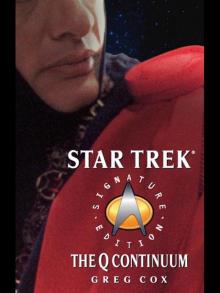 Q-Space
Q-Space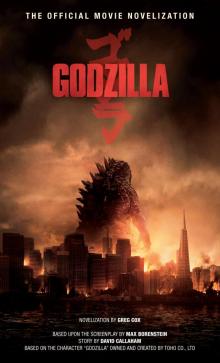 Godzilla - the Official Movie Novelization
Godzilla - the Official Movie Novelization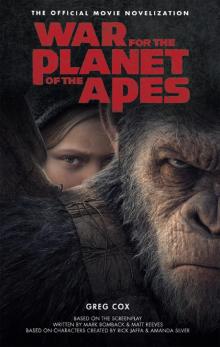 War for the Planet of the Apes: Official Movie Novelization
War for the Planet of the Apes: Official Movie Novelization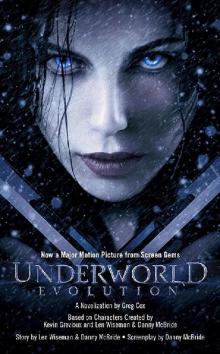 Underworld: Evolution
Underworld: Evolution Underworld
Underworld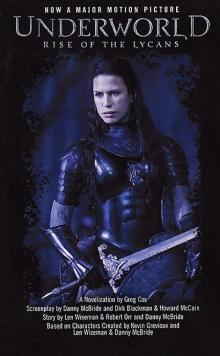 Rise of the Lycans
Rise of the Lycans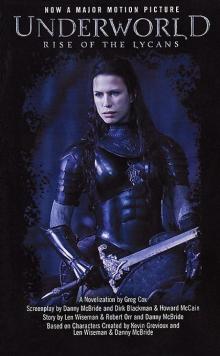 04 - Rise of the Lycans
04 - Rise of the Lycans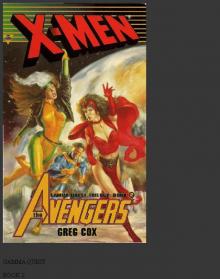 X-Men and the Avengers: Search and Rescue
X-Men and the Avengers: Search and Rescue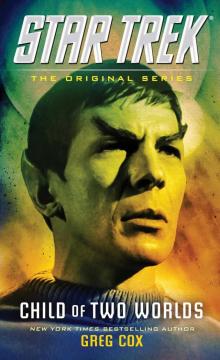 Child of Two Worlds
Child of Two Worlds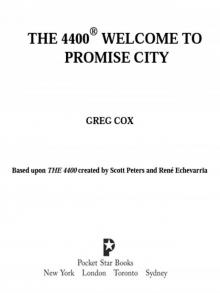 Welcome to Promise City
Welcome to Promise City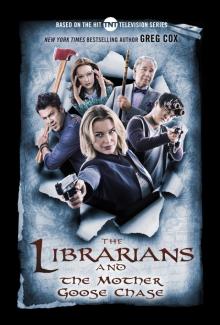 The Librarians and the Mother Goose Chase
The Librarians and the Mother Goose Chase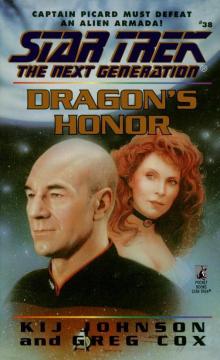 Dragon's Honor
Dragon's Honor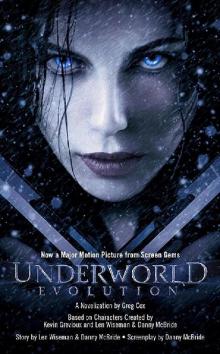 03 - Evolution
03 - Evolution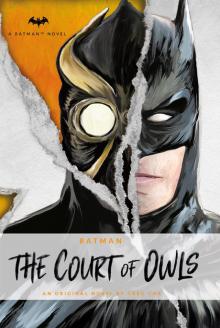 DC Comics novels--Batman
DC Comics novels--Batman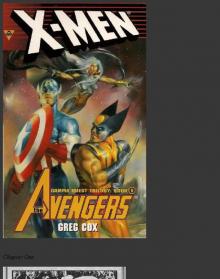 X-Men and the Avengers: Lost and Found
X-Men and the Avengers: Lost and Found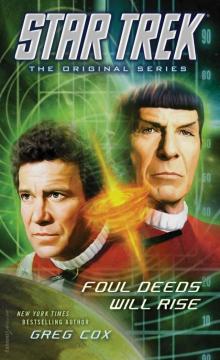 Foul Deeds Will Rise
Foul Deeds Will Rise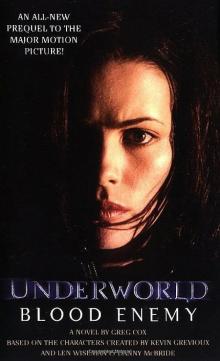 02 - Blood Enemy
02 - Blood Enemy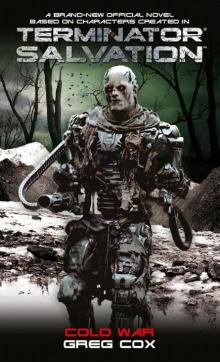 Terminator Salvation: Cold War
Terminator Salvation: Cold War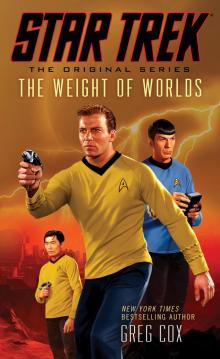 The Weight of Worlds
The Weight of Worlds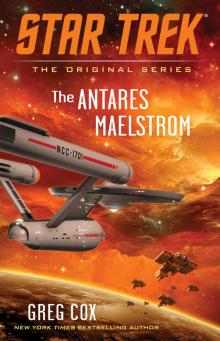 The Antares Maelstrom
The Antares Maelstrom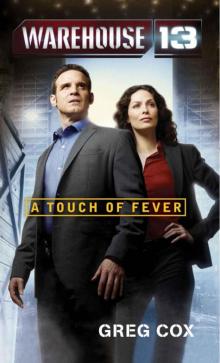 Warehouse 13: A Touch of Fever
Warehouse 13: A Touch of Fever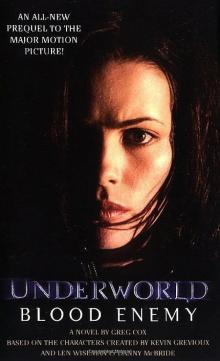 Underworld: Blood Enemy
Underworld: Blood Enemy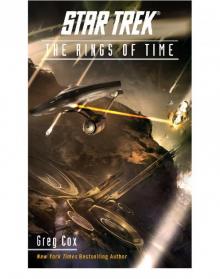 The Rise and Fall of Khan Noonien Singh
The Rise and Fall of Khan Noonien Singh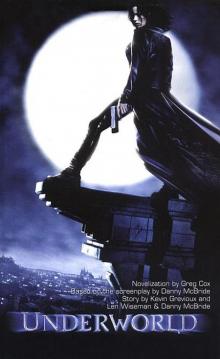 01 - Underworld
01 - Underworld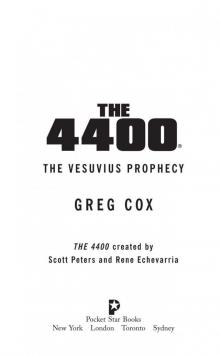 The 4400- the Vesuvius Prophecy
The 4400- the Vesuvius Prophecy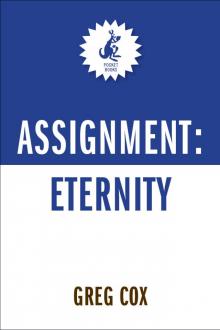 Assignment: Eternity
Assignment: Eternity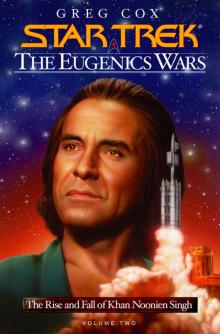 The Eugenics Wars, Vol. 2: The Rise and Fall of Khan Noonien Singh
The Eugenics Wars, Vol. 2: The Rise and Fall of Khan Noonien Singh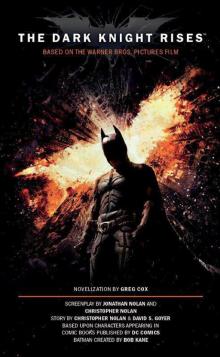 The Dark Knight Rises: The Official Novelization
The Dark Knight Rises: The Official Novelization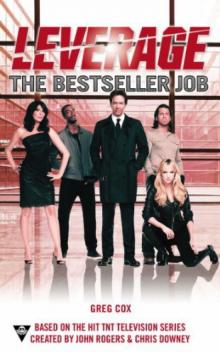 The Bestseller Job
The Bestseller Job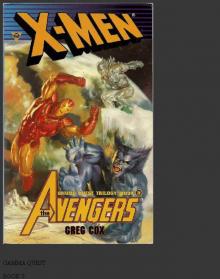 X-Men and the Avengers: Friend or Foe?
X-Men and the Avengers: Friend or Foe?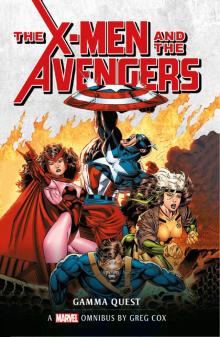 Marvel Classic Novels--X-Men and the Avengers
Marvel Classic Novels--X-Men and the Avengers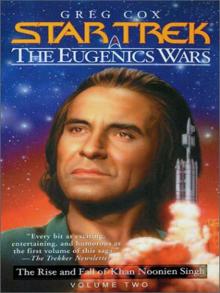 STAR TREK: TOS - The Eugenics Wars, Volume Two
STAR TREK: TOS - The Eugenics Wars, Volume Two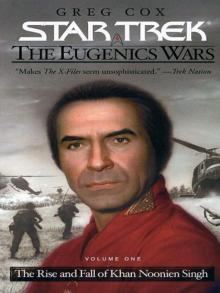 STAR TREK: TOS - The Eugenics Wars, Volume One
STAR TREK: TOS - The Eugenics Wars, Volume One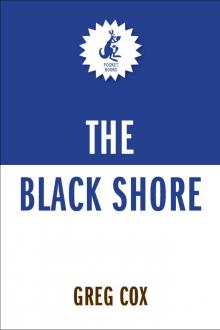 The Black Shore
The Black Shore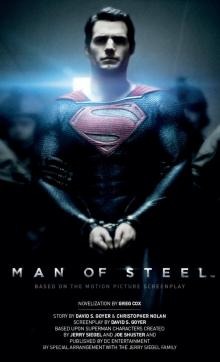 Man of Steel: The Official Movie Novelization
Man of Steel: The Official Movie Novelization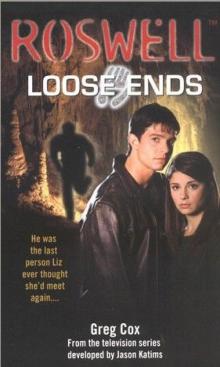 Loose ends r-1
Loose ends r-1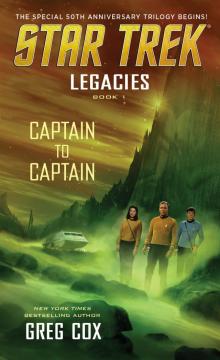 Legacies
Legacies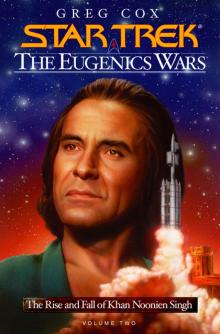 The Eugenics Wars, Volume Two
The Eugenics Wars, Volume Two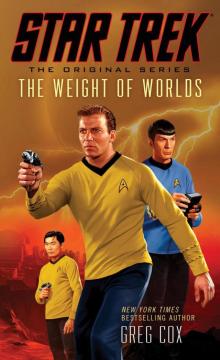 Star Trek: The Original Series - 148 - The Weight of Worlds
Star Trek: The Original Series - 148 - The Weight of Worlds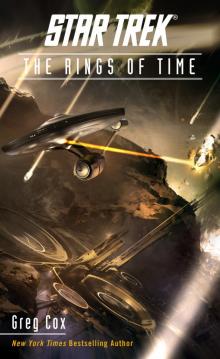 Star Trek: The Original Series: The Rings of Time
Star Trek: The Original Series: The Rings of Time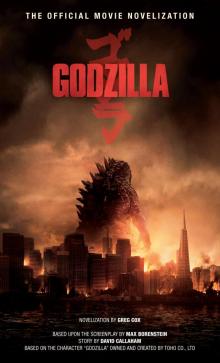 Godzilla--The Official Movie Novelization
Godzilla--The Official Movie Novelization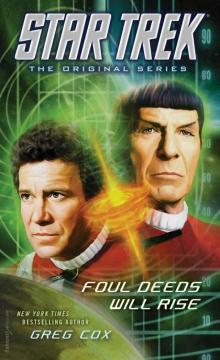 Star Trek: The Original Series - 160 - Foul Deeds Will Rise
Star Trek: The Original Series - 160 - Foul Deeds Will Rise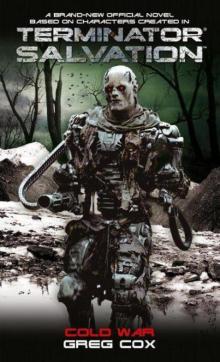 Terminator Salvation: Cold War ts-3
Terminator Salvation: Cold War ts-3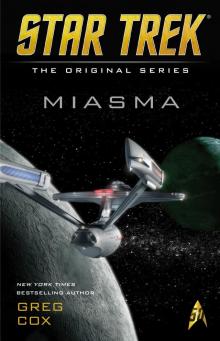 Star Trek: The Original Series: Miasma
Star Trek: The Original Series: Miasma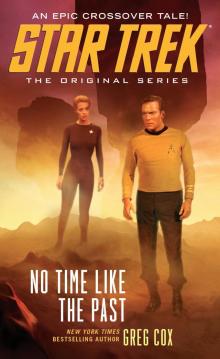 Star Trek: The Original Series: No Time Like the Past
Star Trek: The Original Series: No Time Like the Past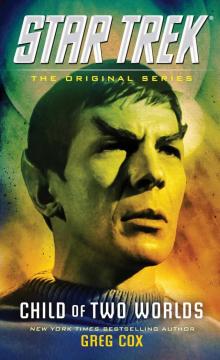 Child of Two Worlds (Star Trek: The Original Series)
Child of Two Worlds (Star Trek: The Original Series)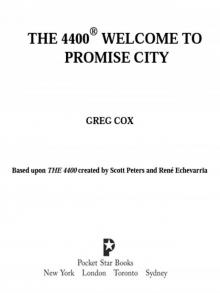 THE 4400® WELCOME TO PROMISE CITY
THE 4400® WELCOME TO PROMISE CITY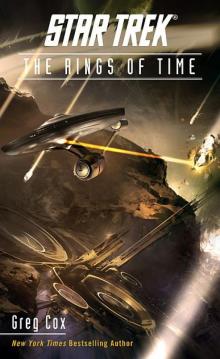 Star Trek: The Original Series: The Rings of Time (star trek: the original series)
Star Trek: The Original Series: The Rings of Time (star trek: the original series) To Reign in Hell: The Exile of Khan Noonien Singh
To Reign in Hell: The Exile of Khan Noonien Singh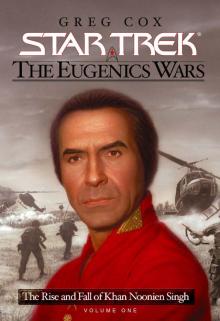 Star Trek: The Eugenics War, Vol. 1
Star Trek: The Eugenics War, Vol. 1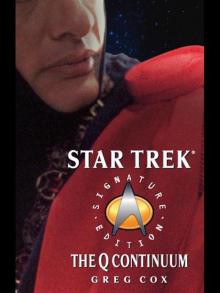 The Q Continuum
The Q Continuum